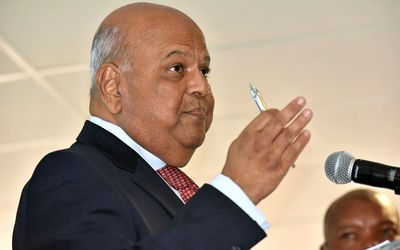Barclays sell-off not a reflection on Africa, says Gordhan
by Sujata Rao,
2016-03-09 05:39:46.0
LONDON — Barclays’s decision to sell its stake in Barclays Africa is a consequence of past mistakes at European banks rather than a reflection of Africa’s future prospects, Finance Minister Pravin Gordhan says.
Emerging markets were often "victims of policymaking" by developed countries and it was wrong to blame them entirely for recent problems, such as the collapse in economic growth and the huge capital outflows they faced, Mr Gordhan said.
News that Barclays would sell a 62% stake in Barclays Africa, reducing it to a minority holding, was seen by many as another blow for a continent hit hard by China’s slowdown and low commodity prices.
But Mr Gordhan rejected that idea. "Barclays is not about Africa," he said on Monday on the sidelines of an investment roadshow in London.
"It’s about Europe and European banks and the way they mismanaged their affairs and … found themselves in difficulties in terms of capital requirements that the financial stability board established by the Group of 20 and (UK) authorities required of them for overseas operations."
He was referring to rules brought in after the 2008 financial crisis that make it more expensive from a capital perspective for banks to hold stakes in other banking organisations.
These rules would force more European banks to retreat from overseas markets in coming years, leaving US and possibly Chinese lenders in the fray, Mr Gordhan predicted.
Barclays Africa chief has also said Barclays’ move did not reflect on Africa, noting a 10% annual profit rise and 17% return on equity from the continent.
The parent company has cut back across emerging markets, aiming to become a "transatlantic" bank, with a US and UK focus. In pounds, the numbers look less rosy. Return on equity falls to 8.7%, below the parent bank’s 11% target. Legacy issues are also hurting: Barclays has doubled its provisions against regulatory missteps.
"Barclays Africa will expand its operations and customer base and create more service centres in different parts of Africa. It will remain as an entity and thrive. What changes is the ownership of the enterprise," the finance minister said.
World powers needed to find ways to direct surplus capital into long-term projects, such as infrastructure, rather than into short-term yield-seeking trades, he urged.
Appointed in December, Mr Gordhan is battling to boost SA’s growth, which is running at less than 1%, and to persuade rating agencies not to cut the country’s credit rating to junk. He noted that his roadshow incorporated government officials, private sector leaders and representatives of SA’s trade unions, indicating a shared understanding of the country’s challenges.
"We understand growth is the key issue. If that denominator changes, everything changes with it," he said.
Reuters

Finance Minister Pravin Gordhan addresses a business conference in Johannesburg last week. Picture: BUSINESS DAY
LONDON — Barclays’s decision to sell its stake in Barclays Africa is a consequence of past mistakes at European banks rather than a reflection of Africa’s future prospects, Finance Minister Pravin Gordhan says.
Emerging markets were often "victims of policymaking" by developed countries and it was wrong to blame them entirely for recent problems, such as the collapse in economic growth and the huge capital outflows they faced, Mr Gordhan said.
News that Barclays would sell a 62% stake in Barclays Africa, reducing it to a minority holding, was seen by many as another blow for a continent hit hard by China’s slowdown and low commodity prices.
But Mr Gordhan rejected that idea. "Barclays is not about Africa," he said on Monday on the sidelines of an investment roadshow in London.
"It’s about Europe and European banks and the way they mismanaged their affairs and … found themselves in difficulties in terms of capital requirements that the financial stability board established by the Group of 20 and (UK) authorities required of them for overseas operations."
He was referring to rules brought in after the 2008 financial crisis that make it more expensive from a capital perspective for banks to hold stakes in other banking organisations.
These rules would force more European banks to retreat from overseas markets in coming years, leaving US and possibly Chinese lenders in the fray, Mr Gordhan predicted.
Barclays Africa chief has also said Barclays’ move did not reflect on Africa, noting a 10% annual profit rise and 17% return on equity from the continent.
The parent company has cut back across emerging markets, aiming to become a "transatlantic" bank, with a US and UK focus. In pounds, the numbers look less rosy. Return on equity falls to 8.7%, below the parent bank’s 11% target. Legacy issues are also hurting: Barclays has doubled its provisions against regulatory missteps.
"Barclays Africa will expand its operations and customer base and create more service centres in different parts of Africa. It will remain as an entity and thrive. What changes is the ownership of the enterprise," the finance minister said.
World powers needed to find ways to direct surplus capital into long-term projects, such as infrastructure, rather than into short-term yield-seeking trades, he urged.
Appointed in December, Mr Gordhan is battling to boost SA’s growth, which is running at less than 1%, and to persuade rating agencies not to cut the country’s credit rating to junk. He noted that his roadshow incorporated government officials, private sector leaders and representatives of SA’s trade unions, indicating a shared understanding of the country’s challenges.
"We understand growth is the key issue. If that denominator changes, everything changes with it," he said.
Reuters





















Change: -0.21%
Change: -0.46%
Change: -1.26%
Change: 0.06%
Change: -0.67%
Data supplied by Profile Data
Change: -0.47%
Change: 0.28%
Change: -0.21%
Change: 0.00%
Change: 0.33%
Data supplied by Profile Data
Change: -0.20%
Change: 0.08%
Change: 0.77%
Change: 0.15%
Change: 0.23%
Data supplied by Profile Data
Change: 0.67%
Change: 0.31%
Change: 1.18%
Change: 0.88%
Change: -0.34%
Data supplied by Profile Data